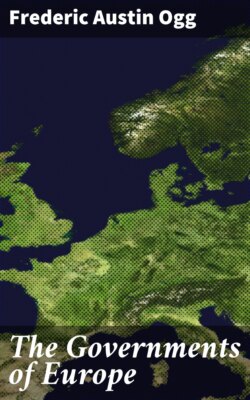Читать книгу The Governments of Europe - Frederic Austin Ogg - Страница 56
На сайте Литреса книга снята с продажи.
II. Parties in the Later Eighteenth and Earlier Nineteenth Centuries.
Оглавление152. Whigs and Tories.—The seventeenth-century origins of political parties in England, the development of Whigs and Tories following the Revolution of 1688–1689, and the prolonged Whig supremacy during the reigns of George I. and George II., have been alluded to in another place.[211] During the eighteenth century the parliamentary system was but slowly coming into its own, and again and again party lines all but disappeared. The recurring rivalry of Whig and Tory elements, however, brought about gradually a habitual recognition of the responsibility of ministers, and this responsibility, in turn, reacted to accentuate party demarcation. The efforts of George III. to revive the royal prerogative had the effect of calling into existence a body of new Tories, not Jacobite, but Hanoverian, who supported the king in his purpose, and at the same time, of driving the forces of opposition to a closer union and more constant vigilance. Throughout the century the tone of party politics was continuously low. Bribery and other forms of corruption were rife, and the powers of government, both national and local, were in the hands regularly of an aristocratic minority which ruled in its own interest. The high-water mark of intrigue was reached in 1783 when the old Tories, led by Lord North, allied themselves with the old Whigs, led by Charles James Fox, to retain power and to curtail the influence of the king. The coalition was unsuccessful, and the defeat of Fox's India Bill, in December, 1783, became the occasion of the younger Pitt's elevation to the premiership, followed within three months by a national election which precipitated an end of the seventy years of Whig ascendancy.
153. The Tory Ascendancy, 1783–1830.—Throughout the ensuing forty-six years, or until 1830, the new Tory party continued almost uninterruptedly in power, although it is to be observed that after 1790 the composition and character of this party underwent important modification. The first decade of the period covered by the Pitt ministry (1784–1801) was a time of incipient but active propaganda in behalf of constitutional, financial, and social reform, and the government was not disinclined to favor a number of the changes which were projected. The outbreak and progress of the Revolution in France, however, completely altered the situation. The great landowners, who constituted the dominating element in the Whig party, detested the principles of the Revolution and were insistent in season and out upon war with France. They secured the support of the parliamentary classes generally, and Pitt and his colleagues were forced to surrender to the apprehensions and demands of these elements. The war was declared by France, but it was provoked mainly by the hostile attitude of the English people and government. At home all reform propaganda was stamped out, and Tories and Whigs alike throughout the quarter-century of international conflict pointed habitually to the abuses by which the upheaval in France was accompanied as indicative of what might be expected in England, or anywhere, when once the way was thrown open for unrestrained innovation.
The Tories were in power during most of the war period and in 1815 their position was seemingly impregnable. During the years covered by the ministry of Lord Liverpool (1812–1827), however, their hold was gradually relaxed. They sought to secure for themselves the support of the masses and talked much of the aristocratic exclusiveness of the Whigs, yet they made it their first concern to maintain absolutely intact the constitution of the kingdom and the political and social order by which it was buttressed. As long as England was engaged in a life and death contest with Napoleon the staying of innovation was easy, but after 1815 the task became one of rapidly increasing difficulty. In the reign of George IV. (1820–1830) the more progressive of the Tory leaders, notably Canning, Huskisson, and Peel, recognized that the demands of the nation would have to be met at some points, and a number of liberalizing measures were suffered to be carried through Parliament, though none which touched directly the most serious problems of the day. In 1830 the resignation of the ministry of the Duke of Wellington marked the end of the prolonged Tory ascendancy, and with a ministry presided over by Earl Grey the Whigs returned to power. With the exception of a few brief intervals they and their successors, the Liberals, held office thereafter until 1874.212]
